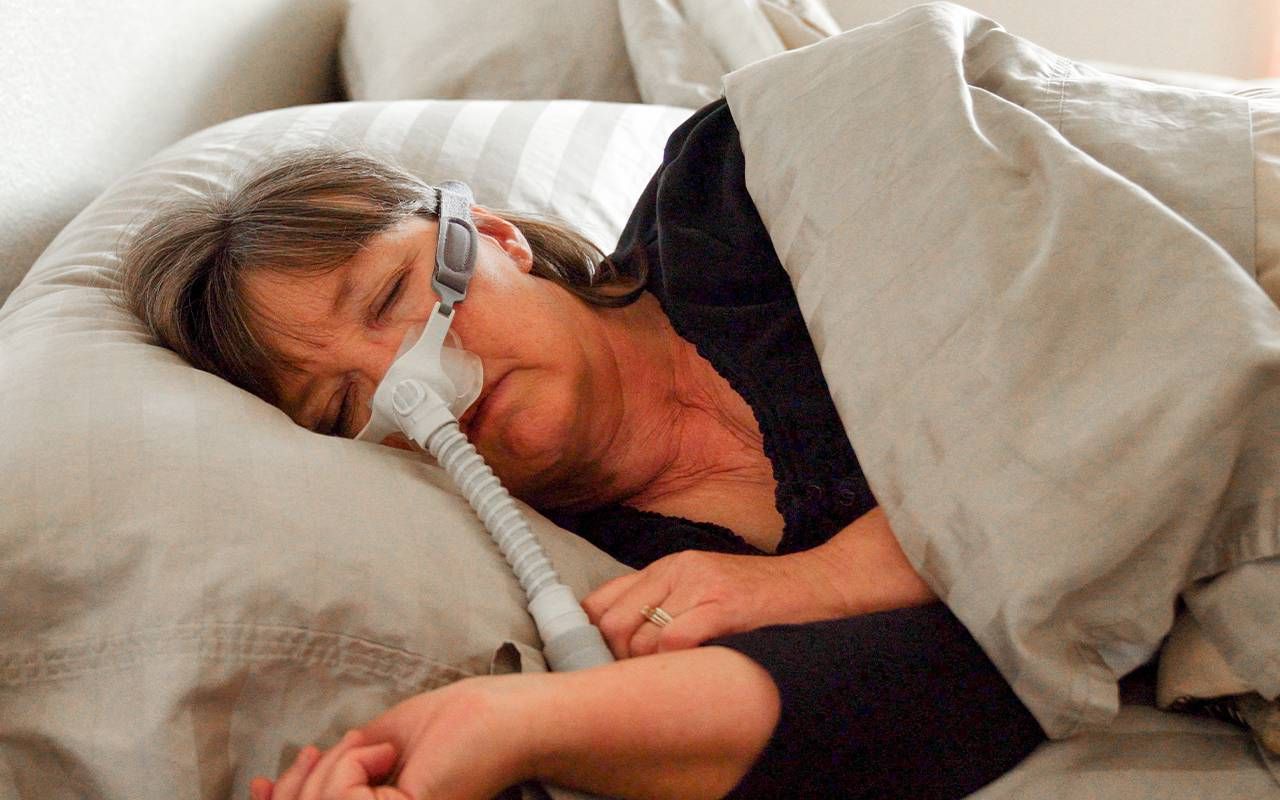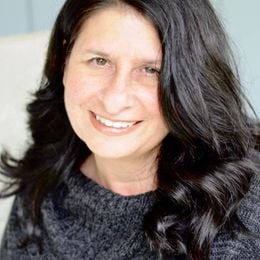CPAP Therapy Benefits for Sleep Apnea
Sleep apnea often goes undiagnosed, ignored and untreated. Here are some benefits of waking up to CPAP therapy.
According to the American Medical Association, approximately 30 million Americans suffer from mild to severe Obstructive Sleep Apnea (OSA), a serious medical disorder causing people to stop breathing repeatedly in their sleep. More alarming, nearly 80% of those with this illness go undiagnosed. While stereotypes portray sleep apnea as an older man's issue, after 50, women are just as likely to have the disease.

Rupal Patel, a 51-year-old mom from New Jersey, discovered she snored in a most unusual way back in 2019. Her son, aged six, recorded Patel taking a nap from his toy watch. She heard a chirping sound and asked him what he was listening to. "It's you, Mommy; you made that noise while sleeping." Patel went for a sleep study and realized she had OSA.
While stereotypes portray sleep apnea as an older man's issue, after 50, women are just as likely to have the disease.
Leah Harris, a mental health advocate from northern Virginia, learned she had sleep apnea a decade ago in her mid-thirties. The results showed mild sleep apnea, and Harris remembers thinking, "Why would I need all that equipment?" And also, as a single person, "Who would be interested in me?" However, once she hit perimenopause in 2019, her symptoms worsened and advanced to moderate sleep apnea.
In my case, during the height of COVID in 2020, my college-aged children told me they could hear me snoring from the other side of the house. My internist dismissed my most pressing concern around memory to menopause and referred me to a sleep specialist after several failed sleeping medications.
Bringing the Machine Out of the Closet
A home sleep study proved moderate sleep apnea, and I tried to wear the mask before hiding it underneath linens. Fast forward to 2023, a new doctor and a second test that showed moderate OSA had progressed to severe, with 200+ "events" (aka not breathing) a night. It was time for the machine to come out of the closet and my attitude to improve.
Sleep apnea closes people's airways between 5-15 times in mild cases to severe, more than 30 times per hour. This happens for multiple reasons (obesity, large neck circumference, tongue too large or narrow face shape). Still, the most crucial piece that physicians don't talk enough about is that without air, we lose oxygen to our brains.
Sleep apnea closes people's airways between 5-15 times in mild cases to severe, more than 30 times per hour.
And this causes many unwanted health issues ranging from memory fog and irritability to high blood pressure, stroke, heart failure, dementia and sometimes death. Yet, even with such dire consequences, statistics indicate that up to 75% of patients give up on the gold standard of treatment, Continuous Positive Airway Therapy ("CPAP"), within the first 30 days.
When used correctly, CPAP is more than 90% effective in eliminating breathing interruptions if assigning the appropriate pressure and settings, wearing a suitable mask and using it consistently.
Since my first go with CPAP, I learned the many health benefits of this treatment:
- Better cardiac health
- Less drowsiness and waking feeling refreshed
- Reduced blood pressure
- Less risk of diabetes
- Improved memory with reduced risk of dementia
- Less depression and anxiety
- Not waking as often to use the bathroom during the night
Additionally, some effects of poor sleep, such as energy levels, mental acuity and hypertension, may be reversible. Jonathan Jun, associate professor of medicine at the Sleep Disorders Center at The Johns Hopkins Hospital in Baltimore, stated, "CPAP lowers blood pressure in the right people as soon as the breathing problem is relieved."
Every part of your body repairs and restores itself during sleep. Sleep apnea breaks the cycle of sleep and prevents the oxygenation of our blood.
But, he noted, "If you've been suffering from high blood pressure for many years, your arteries may have already stiffened and heart muscles enlarged, so the effects probably won't reverse in those instances."
Still, with this high cure rate and lower medical risks, I researched how others have conquered the mask for better health. Here's what experts and long-time CPAP users said.
Sleep Is Vital
When people hear they have sleep apnea, they think of it as a life sentence of sleeping with a mask over their face instead of a hose that keeps them alive. As a result, many (me included) enter (and sometimes stay) in the comfort of denial. But, unfortunately, if you suffer from sleep apnea, where you don't get to go is to a restful, deep sleep.
Gilles Frydman, executive director for the American Sleep Apnea Association (ASAA), explained, "Every part of your body repairs and restores itself during sleep. Sleep apnea breaks the cycle of sleep and prevents the oxygenation of our blood."
Medically speaking, tissues and cells need oxygen from our lungs to work correctly. "Without sleep," Frydman said, "we allow areas such as our heart and kidneys to be under attack."
Conquering Sleep With a Mask
According to Avinesh Bhar, MD, founder of SLIIIP, a physician-led sleep and pulmonary telemedicine practice, "The two most common problems patients experience are mask selection and pressure settings. Once people find what is comfortable, it allows them to get deep sleep, and most never turn back."
"Once you are comfortable wearing the mask, connect the hose to the machine and begin on a low setting to practice breathing in and out normally."
When Patel's cardiologist told her she would likely have a heart attack within five years if she didn't remedy her sleep apnea, she committed to CPAP therapy. "I tried three different masks before finding the right fit," she said. Patel credits working with her sleep specialist with teaching her how to wear the mask correctly.
"I thought it needed to be tight across my face," Patel said, "but I learned that it doesn't have to be uncomfortable to work properly." Once she found a suitable model, Patel went from sleeping 2-3 hours in a row to more than 6-8 every night.
Frydman agrees ongoing support is vital to getting over the 30-day hump in continuing therapy. "The ASAA provides research, access to peer-to-peer learning, and suggestions for sleeping well, so patients aren't alone on this journey." Additionally, Frydman recommends contacting your medical provider, durable medical equipment company (DME) and community resources as other ways to find motivation.
Regarding pressure settings, CPAP machines often default to the most frequently used numbers. However, according to Jun, "Numbers only tell part of the story. Your symptoms matter, too."
For example, if you experience less than five (5) events per hour (considered normal to mild sleep apnea) but still wake up exhausted or are not alert while driving, talk to your doctor to find what works best for you. There are additional ways to get used to your new bedmate.
Practice and Commit
Jeff and Sheila Eurich, 64 and 68, respectively, both nurses by trade, suffer from OSA. Yet, even as health care providers and seeing first-hand the ill effects of sleep apnea on their patients' hearts, it took them time to come to terms with using a CPAP machine.
"Make friends with your CPAP," they said. For example, Jeff suggested reading, doing puzzles, or watching TV with your mask on and away from the machine to allow time to get used to wearing something on your face.
"Once you are comfortable wearing the mask, connect the hose to the machine and begin on a low setting to practice breathing in and out normally," Sheila said.
The couple also stressed the importance of committing to treatment. "Even if you only mask-up for an hour each night, it's a start and takes time to adapt," Jeff explained. "If you never take the plunge, you won't learn what works and doesn't."
Get Informed
Harris wishes providers would give more medical information about the risk/benefit ratio when ignoring this illness. "I simply didn't understand the progression of sleep apnea or the dangers of not getting therapy," she said, adding that she gave into the equipment after the second wake-up call and immediately reaped the benefits. "The quality of my life changed with a good night's sleep."
Even in cases of mild sleep apnea, the first line of therapy is CPAP because it is not invasive, works very well and doesn't result in any permanent changes to the body.
Harris also found comfort and camaraderie on the ASAA website and a Facebook group run by the Sleep Apnea Association. Harris recommends considering the physical and mental health benefits of being rested. "Don't let your fears stop you from finding support," she said. "It's worth reaching out to the various communities for assistance."
Are There Other Treatment Options?
Putting on a mask in the dark, waking up when consciously or unconsciously removing headgear, or becoming more tired than before treatment while getting used to the supplies, requires patience and being kind to yourself. Some people I spoke with experienced immediate benefits, while others took longer to adjust to this new way of slumbering. The statistics and stories, however, speak for themselves.
"Even in cases of mild sleep apnea, the first line of therapy is CPAP because it is not invasive, works very well and doesn't result in any permanent changes to the body," Jun said. "However, if CPAP doesn't work or you prefer another method, there are other options."
One such alternative is the recently FDA-approved medical implant, Inspire. This pacemaker device controls the tongue muscles to keep your airway open when you breathe. According to Jun, there are several factors in determining whether someone is a good candidate for Inspire.
Another choice is having an oral appliance customized for you by a dentist qualified in this area. Jun suggested first checking with your physician on whether either of these solutions may be for you.
Lastly, there are "mini-CPAPs" that you may find in a Google search. "These generate small amounts of pressure that might relieve snoring but would not likely be enough to treat typical sleep apnea," Jun said.
Should You See a Sleep Specialist?
Bhar suggests asking yourself two questions: "Do I sleep well?" and "Do I wake up feeling refreshed?" If you answer "no" to either question, it's time to probe further. And Frydman recommends using a helpful tool called the "STOP-Bang" questionnaire. This screening assesses the likelihood of sleep apnea based on inputs such as age, neck size and body mass index.
Trial and Error
Transparently, my results thus far have been spotty, with some mornings feeling better than others. But while I have now sat through more fittings than for my wedding gown, and my nightstand makes it look like I'm running a dive shop, I will always find the right combination. The most significant benefit of CPAP therapy is living a healthy life. And that is a gift I intend to experience for a long time.
Treating sleep apnea can be expensive, even with standard insurance or Medicare. However, for those who require financial assistance, the American Sleep Apnea Association provides supplies for those in need.


